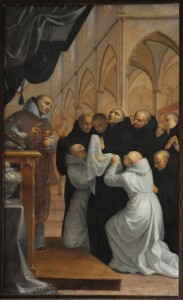 Saint Benedict, [the Father of Western Monasticism (480-543)] blessed by grace as his prophetic name seemed to foretell, was born of a noble Italian family in Umbria, in the year 480. As a boy he showed great inclination for virtue, and maturity in his actions. He was sent to Rome at the age of seven, to be placed in the public schools. At the age of fourteen, alarmed by the licentiousness of the Roman youth, he fled to the desert mountains of Subiaco, forty miles from Rome, and was directed by the Holy Spirit into a deep, craggy, and almost inaccessible cave, since known as the Holy Grotto. He lived there for three years, unknown to anyone save a holy monk named Romanus, who clothed him with the monastic habit and brought him food.
Saint Benedict, [the Father of Western Monasticism (480-543)] blessed by grace as his prophetic name seemed to foretell, was born of a noble Italian family in Umbria, in the year 480. As a boy he showed great inclination for virtue, and maturity in his actions. He was sent to Rome at the age of seven, to be placed in the public schools. At the age of fourteen, alarmed by the licentiousness of the Roman youth, he fled to the desert mountains of Subiaco, forty miles from Rome, and was directed by the Holy Spirit into a deep, craggy, and almost inaccessible cave, since known as the Holy Grotto. He lived there for three years, unknown to anyone save a holy monk named Romanus, who clothed him with the monastic habit and brought him food.
He was eventually discovered, when, one Easter day, God advised a priest who lived about four miles from there, to take food to His servant, who was starving. The priest searched in the hills and finally found the solitary, and they took their meal together. Some shepherds also knew of his retreat, and soon the fame of this hermit’s sanctity began to spread. The demon persecuted him, but to no avail; when a temptation of the flesh assailed him, he rolled in a clump of thorns and nettles, and came out of it covered with blood but sound in spirit.
Disciples came to him, and under his direction, numerous monasteries were founded. The rigor of the rule he drew up, however, brought upon him the hatred of some of the monks, and one of them mixed poison with the Abbot’s drink. When the Saint made the sign of the cross on the poisoned bowl, it broke and fell in pieces to the ground.
Saint Benedict resurrected a boy whose father pleaded for that miracle, saying Give me back my son! He replied, Such miracles are not for us to work, but for the blessed apostles! Why will you lay upon me a burden which my weakness cannot bear? But finally, moved by compassion, he prostrated himself upon the body of the child, and prayed: Behold not, O Lord, my sins, but the faith of this man, and restore the soul which Thou hast taken away! And the child rose up, and walked to the waiting arms of his father. When a monk lost the iron head of his axe in a river, the Abbot told him to throw the handle in after it, and it rose from the river bed to resume its former place.
Six days before his death, Saint Benedict ordered his grave to be prepared, then fell ill of a fever. On the sixth day he asked to be carried to the chapel, and, having received the sacred Body and Blood of Christ, with hands uplifted and leaning on one of his disciples, he calmly expired in prayer, on the 21st of March, 543.
Reflection. The Saints never feared to undertake any work for God, however arduous, because distrusting self they relied for assistance and support wholly upon prayer.
Little Pictorial Lives of the Saints, a compilation based on Butler’s Lives of the Saints and other sources by John Gilmary Shea (Benziger Brothers: New York, 1894); Les Petits Bollandistes: Vies des Saints, by Msgr. Paul Guérin (Bloud et Barral: Paris, 1882), Vol. 3